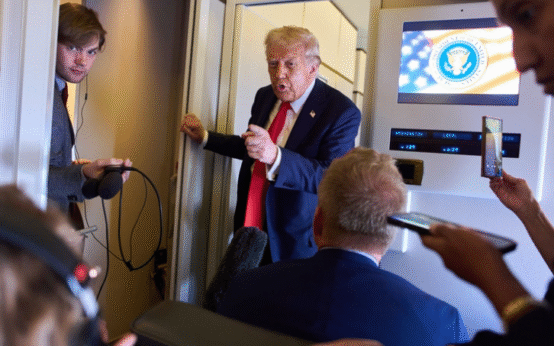Public opinion polls continue to highlight the growing divide in American politics. Recent surveys show that more Americans now disapprove of President Donald Trump than those who support him. A UMass Amherst poll reveals that only 43% of Americans approve of his performance, while 54% disapprove. This shift suggests that Trump’s policies and leadership style are losing ground among voters who once viewed him favorably.
U.S. Tariff Policies Fuel Economic Strain and Political Backlash
One of the biggest reasons behind Trump’s falling approval is his tariff policy. By imposing heavy trade duties on imports, especially from major economies, Trump hoped to boost U.S. industries. However, the reality has been far more complicated. A Pew Research survey shows that 61% of Americans disapprove of his tariff plans, as they directly raise consumer prices on everyday goods.

From household essentials to industrial raw materials, rising costs are squeezing families and small businesses. Even some Republican voters in working-class communities have begun questioning whether tariffs truly benefit them.
Crime Policy Becomes Trump’s Strongest Card Amid Changing Issues
While tariff disputes have hurt his popularity, Trump has shifted attention toward law and order. His focus on crime prevention and stricter enforcement has gained support in certain regions. An AP-NORC poll shows that 53% of Americans approve of his approach to crime, giving him a political boost.
For many voters, concerns about public safety resonate strongly, particularly in cities struggling with crime spikes. Still, crime alone may not be enough to outweigh the dissatisfaction linked to economic hardships caused by tariffs.
Deepening Divisions Inside Trump’s Republican Coalition
Trump’s strength lies in his ability to rally a passionate base, but that base is not as unified as it once was. Reports suggest the Republican Party is divided into at least six factions, including traditional conservatives, MAGA loyalists, economic nationalists, and moderates.

These groups often disagree on how to handle issues such as tariffs, immigration, and foreign policy. The challenge for Trump is keeping them together under one political message. A fractured coalition could weaken his influence within Congress and make it harder to pass his agenda.
These movements are not only about opposing Trump’s policies but also about presenting alternative visions for America’s future. Their efforts could play a decisive role in the next elections, especially in swing states where voter turnout often decides the outcome.
Threats to Democratic Institutions Raise Wider Concerns
Beyond the day-to-day politics, some experts warn of a deeper problem erosion of democratic norms. Trump’s critics argue that his aggressive use of executive powers and disregard for traditional checks and balances weaken American democracy. Think tanks like the Carnegie Endowment have compared the U.S. situation to democratic backsliding seen in countries like Turkey.
Trump still maintains a loyal base of supporters who see him as a fighter against the political establishment. However, his declining approval ratings, unpopular tariff policies, and a divided Republican coalition all present major obstacles.


 Trump Escalates Trade Pressure on Canada with Tariffs on Wood
Trump Escalates Trade Pressure on Canada with Tariffs on Wood  Hamas Says It Has Not Received Trump’s Plan
Hamas Says It Has Not Received Trump’s Plan  Kim Jong-un Open to Trump Meeting Without Denuclearization
Kim Jong-un Open to Trump Meeting Without Denuclearization  U.S. Envoy Reveals Depths of Trump’s Grudge with Canada
U.S. Envoy Reveals Depths of Trump’s Grudge with Canada  US judge tosses Trump’s $15 billion New York Times lawsuit
US judge tosses Trump’s $15 billion New York Times lawsuit  Trump turns crypto king but at what cost?
Trump turns crypto king but at what cost?